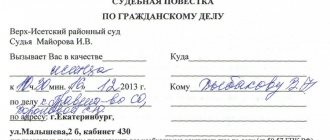A statement of threats can be filed with the police or prosecutor's office, although without much hope of initiating a criminal case against the attacker. In any case, such a statement can be an effective way to suppress illegal actions. .DOC files: Threat Statement FormSample Threat Statement
Types of threats
In fact, the scope of threats is much wider than is commonly understood. The Criminal Code of the Russian Federation provides for liability only for threats to life or health. However, there is an equally significant layer of threats relating to the dissemination of personal defamatory information or damage to property, which is ignored by criminal law, although the Criminal Code of the Russian Federation provides for liability for completed (committed) acts of this type.
That is, there is criminal liability for the intentional destruction of property, for slander, for incitement to suicide, but there is no provision for liability for threats to commit these actions.
This is a serious lacuna in the legislation, since the initiation of a criminal case in connection, for example, with threats of slander, could prevent a large number of crimes, including the crime provided for in Article 110 of the Criminal Code of the Russian Federation (incitement to suicide).
However, at the moment the Criminal Code of the Russian Federation contains only Art. 119, which provides for liability exclusively for threats to life or threats of causing serious harm to human health.
Signs of a crime
Disposition Art. 119 of the Criminal Code provides the main sign of a threat to kill or cause harm to health, necessary for its qualification as a criminal offense, namely the sign of reality, that is, the presence of grounds to believe that the threat is feasible.
This is precisely the main difficulty in bringing an attacker to justice. In fact, there is not a single reliable sign by which the threat can be considered real. And this is precisely the explanation for the weak effectiveness of this article.
Suppose that a death threat comes to an ex-wife from an ex-husband in connection with a dispute between them over the division of an apartment. If we hypothetically imagine that the ex-husband was previously convicted of murder, there is reliable information that he tried to break into his ex-wife’s house several times with an ax and, moreover, is registered as a drug addict, then, of course, the threat can be regarded as real.
But, as a rule, such a set of signs is rare in real life, and threats to kill much more often come from completely law-abiding citizens, and there is not a single criterion by which empty threats can be differentiated from real malicious intent.
Perhaps psychological or psychiatric examinations could shed some light on intentions, but it is impossible to force a citizen to undergo it without first initiating a criminal case.
The very fact that the victim has reason to fear for his life and health will not be a sufficient basis for criminal prosecution of the attacker, since fear is a subjective sign, and the accusation can only be based on objective evidence.
Should you contact the police?
Any application from citizens to law enforcement agencies is subject to verification, even if the verification is formal. Sometimes even this formal verification is enough for the threats to stop.
Therefore, a statement about the fact of threats must be written, even if the victim is sure that the threats are not real. The fact is that the procedure for verifying citizens' appeals in cases allegedly relating to crimes committed includes a mandatory interrogation of the person accused of making threats.
Even without grounds to initiate a criminal case, a police officer will issue a warning to the attacker about the inadmissibility of threats.
To a certain extent, this is due to the caution of law enforcement officials, since if threats are carried out, the material at the victim’s request will certainly be raised and studied. This means that a police officer who does not check all the circumstances of the application will be punished very severely.
Thus, even a seemingly hopeless statement of threats will be checked by the police with the utmost care. In most cases, the very fact of verification will be enough for the author of the threats to stop illegal actions.
Moreover, if the threats were accompanied by other illegal actions, for example, insults or hooliganism, then, depending on the consequences of these actions, an administrative or criminal case may be initiated.
Let's imagine this situation. The attacker shouted threats in a public place, threatened the victim with a stone, insulted and pushed him. For the police, these are sufficient grounds to bring him to administrative responsibility for petty hooliganism. If, as a result of the tremors, the victim falls and is injured, then it is quite possible to initiate a criminal case.
That is, although the victim may be denied his request to initiate a criminal case under Art. 119 of the Criminal Code of the Russian Federation, but the attacker himself may well be punished, albeit for committing another crime or offense.
The legislative framework
The procedure for bringing to criminal responsibility an offender who threatens to take the life or harm the health of another person is considered in Article 119 of the Criminal Code of the Russian Federation. If criminal intent is confirmed, the legal framework provides for the following sanctions for the guilty person:
- If there are no political, national or religious motives in the threats, the attacker will face 2 years in prison or restriction of freedom, or administrative arrest for up to 6 months.
- In the presence of aggravating circumstances excluded from the previous paragraph, the offender is punishable by imprisonment of 2 to 5 years. The court limits the list of positions held by the guilty person and the list of types of business activities available to the offender. The restrictions apply for 3 years.
Since the threat to human life and health causes concern, disrupts the usual way of life and negatively affects performance, the victim has the right to demand moral compensation from the offender. The monetary equivalent of the damage caused by the attacker is used to compensate for the damage.
To obtain a conviction in a procedural proceeding, the victim must submit a statement to the law enforcement agency, supported by irrefutable evidence. Each case is considered individually, including investigative measures to investigate the circumstances of the crime committed.
Special credit
The fact that the Criminal Code of the Russian Federation does not provide for the possibility of prosecution for threats of a type other than murder or injury to health cannot limit the right of a citizen to contact the police if any threats arise.
Let us especially focus on threats of dissemination of defamatory information or threats of destruction of property, the authorship of which in recent times often belongs to collectors.
Such threats should not be tolerated, moreover, if they cause significant harm to a person’s normal life.
Writing on walls and cars, making threatening calls - all this is an offense that can lead to the revocation of the collection agency's license. Therefore, statements about illegal actions of debt collectors must be written.
Basic provisions
The real picture Among everything a citizen needs to contact the police, it is worth highlighting:
Fraud is the theft of someone else's property through deception and abuse of trust. Most often, applications are received for the following reasons: the debt was not repaid in a timely manner, the seller did not transfer the goods to the buyer within the agreed time frame. In this case, it is necessary to prove the intent that must arise during the transaction. That is, the person must already obviously assume that he is not going to return the money or transfer the goods.
Threat confirmation
Of course, the facts of the threats must be confirmed. The following may serve as confirmation:
- audio and video recordings;
- any written evidence, planted notes, emails, SMS, photographs of inscriptions on the door to the apartment or on the windshield of the car, etc.;
- witness's testimonies. Let us clarify that there are no restrictions on witnesses, and they may well be members of the victim’s family;
- printouts of incoming calls, if they indicate calls from the attacker’s phone number.
How to prove?
In order to prove an insult , previously (until 2012) two witnesses were needed in whose presence it was uttered. Currently, this procedure has become simplified, since the issue is considered primarily administratively in accordance with Art. 5.61 of the Administrative Code, which does not have legal consequences in the form of a criminal record, which remains practically throughout the citizen’s entire life.
Nowadays, to convict the culprit . In addition to witness testimony, video or audio recordings, photographs and other possible materials can be used as evidence of guilt. Of course, you may not predict at what moment you will be insulted and, most likely, you will not have time to turn on the recorder. However, many citizens turn it on almost always when the conversation gets louder. This habit will always allow you to protect your rights, as well as punish the offender according to his deserts.
If you didn’t have time to do this, ask those around you if anyone managed to film or record this person’s words. Also, do not hesitate to reach out to others and ask for their addresses so that they can testify in your favor. If the incident took place in a public place, ask where the video cameras are and whether your conflict was in their field of view.
It is no more difficult to prove the guilt of a person who systematically allows offensive remarks and statements addressed to you in a domestic environment.
Such relationships are often found on the part of neighbors. How to correctly file a statement of insulting a neighbor to the police (militia)? You need to work with them very carefully, the process of communication between you needs to be completely under control.
The evidence base must be obtained as follows:
- Turn on the recorder (discreetly) when he starts negative dialogue.
- If he insulted you, and you did not have time to record it, you can: turn on the recorder (unnoticed), start a conversation about what he said to you last time (repeat) the phrase for which you demand an apology from him. His reaction to this, if he refuses to apologize and continues to make obscene statements, will be proof.
- Invite friends over and have this conversation so they can testify.
- Ask other victims he abuses to band together and testify in each other's defense.
You can find many similar options and actively use them.
What is the difference between statements of insult to honor and dignity and insult to personality?
Before filing a complaint about insult and threats, it is necessary to clarify one important point. Until 2012, the current Article 130 of the Criminal Code of the Russian Federation provided for the wording “insulting a person .
Modern legislation provides for the wording “insult to honor and dignity” in accordance with the administrative liability charged. It logically follows that the relevance of the statement will be determined by the insult to honor and dignity. There are no differences in the fact of the act, since honor and dignity are the property of the individual citizen.
Where to contact
You should not unnecessarily burden yourself with questions of jurisdiction. The fact is that law enforcement agencies are a single system, regardless of department.
Therefore, a statement of threats can be submitted:
- district police officer;
- the duty officer of the district police department;
- duty officer of the Department of Internal Affairs;
- to the Ministry of Internal Affairs;
- to the district, city, regional or general prosecutor's office.
In any case, the application will be forwarded to its destination precisely to the body authorized to consider applications of this type.
Note that sometimes sending an application to a higher authority is an effective way to achieve special attention to the application in a lower authority. This is due to the fact that when the application is forwarded to the primary law enforcement agency, a higher authority takes control of the application.
This means that in the covering letter, the higher authority will require the lower one to consider the application within a timely manner and notify them of the measures taken.
The prosecutor's office has the right to independently examine allegations of threats without forwarding them to the police. In this case, the assistant prosecutor will conduct an investigation and, if necessary, order the police to take additional measures.
The application can also be submitted online on the State Services website by accessing.
Review period
By law, any application must be considered no longer than three days. But in practice this is never enough. It is impossible to conduct an inspection, interview all witnesses, inspect the scene of the incident and draw up all the reports.
Therefore, the law provides for the possibility of extending these deadlines.
In Art. 144 of Part 3 of the Criminal Procedure Code states that, if necessary, the consideration period is extended to 10 days.
Among the reasons that the police indicate in the resolution are:
- the need to interview all witnesses;
- waiting for the results of the examination;
- obtaining the necessary information about what happened.
However, it happens that the examination takes much longer than 10 days, the policeman has not received answers to his requests from various authorities, the suspect cannot be interrogated due to his absence or attempts to hide.
In this situation, the investigator postpones making a decision for up to 30 days.
After a month, the applicant must be sent a response in the form of a decision: to initiate or refuse to initiate a case.
In cases of private prosecution, the police refer the case to the magistrate's court. If a citizen does not agree with the decision, he can appeal it in court within ten days.
What is the time frame for initiating a criminal case from the day the crime was committed? Find out the answer right now.
Application form
For law enforcement agencies, the form of citizens' applications does not matter. That is, the application must contain information about the applicant and a description of the event in connection with which the application was written. All other information will be clarified by the police officer or prosecutor during the consideration of the application.
Since threats can be regarded as information about an impending crime, the statement of threats can be anonymous. However, it should be taken into account that without clarifying all the circumstances from the applicant, the already small chances of initiating a criminal case will turn into nothing. That is why we recommend not to take the wrong steps, but to write a statement on your own behalf, without hiding behind anonymity.
The victim does not even need to know the author of the threats, since searching for attackers is the responsibility of law enforcement officials.
You should not believe Internet sources that scare the reader by saying that an “incorrect” application will not be accepted for consideration. Law enforcement agencies accept all statements, regardless of how they are written. This is the essence of the system of legal protection of citizens.
Ideally, the application should be accompanied by evidence confirming the existence of threats. But even if you don’t do this, it’s okay. The law enforcement officer who will consider the application will definitely ask about the evidence of the author of the application.
The role of the media
The second part of the commented norm indicates the importance that media have in the life of society today. Strengthening the role of the media in conditions of openness requires the establishment of a separate set of provisions relating to the verification of messages distributed in mass media.
In this regard, specific responsibilities of editorial directors are determined. They must hand over all available materials containing information about the acts. We are talking, in particular, about audio, video recordings, documents, photographs, etc.
The law obliges the head of the editorial office to convey information about the subject who became the source of the message. However, the rules take into account constitutional provisions regarding confidentiality of information. If a person acting as a source of data imposes a condition on keeping information about him secret, then the editors are obliged to fulfill it. Accordingly, they cannot demand to disclose it.
Contents of the statement
For a statement to the police, there are several structural components that it is advisable to include in the text, namely:
- name of the authority to which the application was sent;
- Full name (or name for legal entities) of the applicant, his address and, if possible, data for quick communication, for example, telephone number or email. This component is not mandatory, that is, the application will be accepted even if it is anonymous;
- description of the event. In this part, it is advisable to communicate the threats and their type as concisely as possible. If the applicant knows the author of the threats, then his information should be indicated. If it is unknown, it is advisable to indicate at least some information that will allow it to be identified. If there is no information, then this will not be an obstacle to applying;
- description of related actions. Let us remind you once again about the low chances of initiating a criminal case based on threats. That is, if the actions of the attacker, in addition to threats, also contained other illegal acts, be sure to write about this in the application or report it when selecting explanations;
- list of attachments, if they are attached to the application. Let us remind you once again that this is also not a mandatory condition;
- date of application and signature of the applicant.
After filing an application, the victim will necessarily be summoned to the law enforcement agency to provide explanations on his application.
Legal services
Federal Law “On the procedure for considering appeals from citizens of the Russian Federation.” A written request must contain:
- The name of the internal affairs body to which the appeal is sent, or the surname, first name, patronymic (the latter - if available) of the official of the internal affairs body, or his position;
- Last name, first name, patronymic (last if available) of the citizen;
- Postal address for sending a response or notification of forwarding the request;
- Personal signature and date;
- If necessary, in support of his arguments, the citizen attaches documents and materials or copies thereof to the written appeal.
Newspapers, magazines and other printed publications received from a citizen without an application outlining the substance of the request are not subject to registration and consideration.










